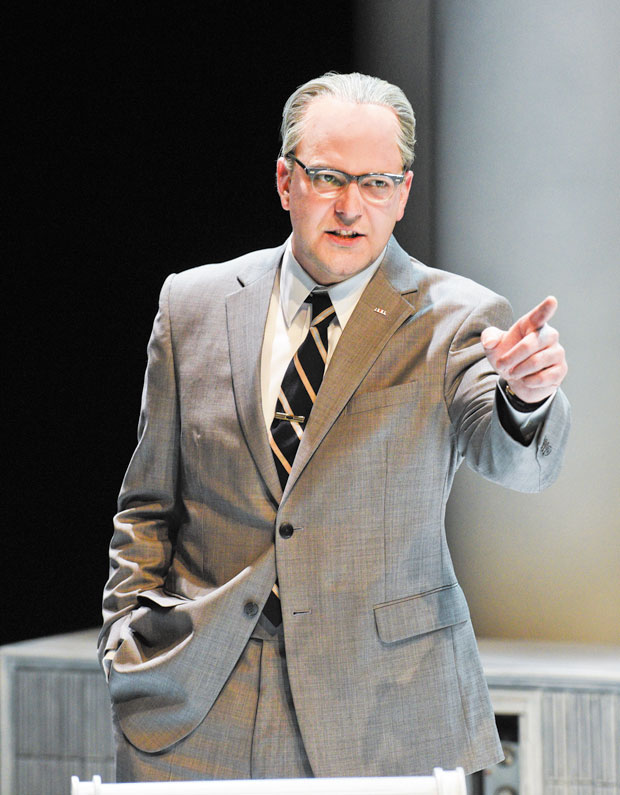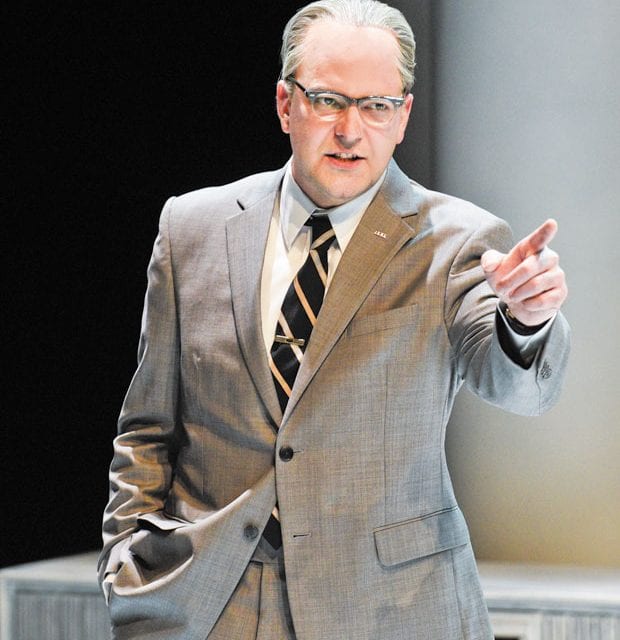LBJ goes ‘All the Way,’ but DTC’s staging is a disappointing tragedy of errors
 It’s a tenet of criticism that you can only review the thing in front of you. The cake is stale, the piano is out of tune, the soprano has laryngitis? It doesn’t make any difference how well-intentioned the artists involved are — if they give you lemons, you don’t get to make lemonade.
It’s a tenet of criticism that you can only review the thing in front of you. The cake is stale, the piano is out of tune, the soprano has laryngitis? It doesn’t make any difference how well-intentioned the artists involved are — if they give you lemons, you don’t get to make lemonade.
It’s with that in mind that Dallas Theater Center’s production of All the Way stands as one of the most frustrating shows of the current season: A play that, as written, is full of good, relevant ideas — it’s about the first year of LBJ’s presidency, when he was running for his party’s nomination while trying to force the 1964 Civil Right Act through a hostile Congress — but this production is a complete mess, staged with such disregard for its audience’s attention span as to almost feel insulting.
Directed by Kevin Moriarty, the artistic director of the Dallas Theater Center, it opened last month at Houston’s Alley Theatre (the first such co-production between the two Texas regional powerhouses). Perhaps that space was more conducive to Moriarty’s blocking decisions, but in the thrust configuration of the Wyly Theatre’s Potter Rose Hall, it feels almost like he’s thumbed his nose intentionally at season ticket-holders. Seated in the third row of the orchestra, I watched the entire production behind a phalanx of bulky, unnecessary wicker chairs. It might as well have been a radio play for great swaths of dialogue (and there is lots of dialogue) as Moriarty peculiarly sets two-thirds of the action at or near the proscenium line of the stage. I’m not sure what compulsion forces theater directors to place the action as far from the seats as humanly possibly; you’d think they would take full advantage of the benefits of flexible configurations to bring the actor close to those paying their salaries.
Then again, the choice in this case could be justified for one good reason: to hide from sharp-eyed patrons the appalling amateurish makeup (lace-front toupees to beat the band! Get a drag queen in the dressing rooms to show them how to do this right) and ill-fitting, frumpy costumes, riddled with bad hems and ratty fabrics. (I hope the real president of the U.S. doesn’t give stump speeches with moth-eaten holes in his trousers.) And for this privilege you get to sit in the notorious Wyly chairs, which, if I’m not mistaken, are what Donald Trump had in mind when he said he’d bring back water-boarding “and worse” to torture Gitmo inmates. (“I confess! I kidnapped the Lindbergh baby and conspired to shoot JFK! Just please give me a shorter first act!!!”)
 In order to squeeze all these missteps into a lean three hours, Moriarty also employs the most overused tropes of modern theatrical staging: Deafening and sudden music cues to separate scenes (it’s meant to seem cinematic — the live-action equivalent of film editing — but after a decade of this gimmick, it feels more like auditory manhandling), and on-set projections to spell out the times and dates of key events. Look, no one appreciates being well-oriented in a story’s timeline better than I do, but when we’re forced to read “eleven months … until election….” “ten months…,” “seven” every three minutes, you’re not adding anything that focuses our attention or adds real value. The entire play takes place over a mere 50 weeks; I think I got this time thing covered.
In order to squeeze all these missteps into a lean three hours, Moriarty also employs the most overused tropes of modern theatrical staging: Deafening and sudden music cues to separate scenes (it’s meant to seem cinematic — the live-action equivalent of film editing — but after a decade of this gimmick, it feels more like auditory manhandling), and on-set projections to spell out the times and dates of key events. Look, no one appreciates being well-oriented in a story’s timeline better than I do, but when we’re forced to read “eleven months … until election….” “ten months…,” “seven” every three minutes, you’re not adding anything that focuses our attention or adds real value. The entire play takes place over a mere 50 weeks; I think I got this time thing covered.
So, those are all the ways that All the Way goes wrong with staging; then we have the casting conundrums. I’m all in favor of local casting — most of the 17 actors here are culled from the resident acting companies of the DTC and the Alley — but this one feels cobbled together. Martin Luther King Jr. was 35 years old during all the events portrayed, but actor Shawn Hamilton looks at least a decade older, and despite a pencil moustache, totally ignores King’s vocal richness: The honeyed baritone, the preacher’s pacing. There’s very little in terms of attempted impersonation. Compare that with Michael Brusasco as George Wallace, who seems like a MadTV version of the racist cracker — a performance that’s all bad wig and cornpone clichés without any subtlety. (Quite a few of the over-the-top accents, gimmicky tics and exaggerated reactions elicited titters from the audience opening night.)
In some ways, it’s hard to fault the actors, almost all of whom play two and three characters apiece. They have scant seconds to sputter and blink their eyes after having been berated by the volatile, paranoid bully who was Lyndon Baines Johnson. As played by Brandon Potter, he’s part sociopath, part master politician. (Is there a difference?) He treats everyone from Lady Bird to J. Edgar Hoover with a rollercoaster of sweet cajoling and spewed invectives. I can’t tell if it’s a complex portrait of a man in all his moods or a salad of random ideas tossed with a tangy vinaigrette.
I suspect that the author, Robert Schenkkan (who won a Tony Award for All the Way and is a native Texan), cobbled together the most complete portrait of that man he could, given limitations of a work of theater (he didn’t have Robert Caro’s gift of 3,000 pages of historical research to develop the character). He presents a warts-and-all portrait of the man as a craven manipulator but also a principled liberal, who would do whatever he could to achieve his goals. In that way, it plays like Richard III with an air of sympathy. And Schenkkan inserts plenty of references to the art of the possible that play out with shockingly timely echoes of the current election cycle. It’s too bad all these good things are tied up in a bloated, loud and hopelessly opaque version. It reminds me of Will Rogers’ backhanded dictum: “I’m not a member of an organized political party — I’m a Democrat.” So, sadly, is this production.
This article appeared in the Dallas Voice print edition March 11, 2016.
Editor’s note: The actor playing Martin Luther King was incorrectly identified in the print edition. The corrected credit has been made here.
















